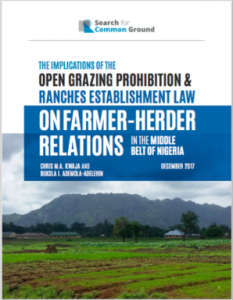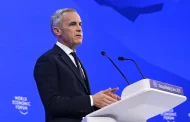The United Nations, (UN) is calling for deliberate actions to end targeted killings around Nigeria, saying all attacks targeting civilians amount to violation of international humanitarian law. Singling out Plateau killings in Nigeria even as it made West and Central Africa the subject of its intervention in a statement by Stephane Dujarric who speaks for the Secretary-General, the UN’s reference to violation of international humanitarian law has policy and normative implications for the Nigerian State in international politics.

Immediate past UN Sec-Gen, Ban Ki-Moon, during a 2015 visit to Nigeria
Expressing deep concern about the frequency, intensity, complexity and geographic scope of violent conflict between farmers and herders, the UN Secretary-General is asking of governments, regional organisations, civil society and other relevant actors in affected countries to work together to find acceptable and lasting solutions to these conflicts but in full compliance with existing regional regulatory frameworks and international humanitarian and human rights law. Assuring of the readiness and commitment of the world body to support such national and regional efforts to resolve disputes between farmers and herders.
Although the United States has commented on the latest round of killings in Plateau State of Nigeria, it is the comment from the UN that has put the killings under the global governance lens in the sense that a bottom-top approach to solution involving civil society and regional processes is being invoked. The question though is whether the framing of the crisis as a farmers-herders conflict by the UN helps or complicates the domestic consensus crisis since that frame implies its own solution.
All the most key stakeholders are saying a different thing at the moment. The Presidency is singing a different song from the opposition party, perhaps naturally, given the way opposition is understood here; the National Christian Elders Forum, (NCEF) has a different argument from the Miyetti Allah just as the Middle Belt Forum does not stand on the same page with MACBAN. While the Plateau State governor is more worried about the breach of a peace pact he had worked on, individual actors such as Obasanjo are saying there must be an explanation of what is happening. Voices have been heard from outside Nigeria’s shores, especially the United States. Even from there comes discordant tunes. While President Trump and a certain lawmaker are saying it is killing of Christians, the American State operated at the level of condemning the killing and the US Ambassador particularly stressed a commitment to coming together and to high national purpose by the elite and the citizens as the way out.
Can a country resolve a crisis it cannot collectively define? Can the cat of surreptitious violence be dealt with without the nature and direction of the cat being uncovered first? Who bells the cat and how has thus become the most important question in confronting the stalemate over incessant bloodshed across Nigeria, something from which no one is safe today. Belling the cat in this case means framing the violence in terms that have a binding or constitutive force on all contending interests. Right now, that is still elusive, to the extent that no consensus exists as to the name of the violent attacks on selected communities in Barkin Ladi, Riyom, Bassa and Jos South Local Government Areas of Plateau State last weekend. Was it a herders-farmers relay of violence or a communal conflict or politically sponsored destabilisation act by desperate politicians or genocide or Jihadi or land occupation agenda?
Even the Forum on Farmer-Herder Relations in Nigeria (FFARN), unarguably the most concentrated platform of researchers, teachers, practitioners and/or the intelligentsia in the theory and practice of healing fissures in the Nigerian polity is not free of ambiguity. In a statement on the latest round of violence, FFARN recognized that the recent attacks is beyond farmer-herder conflict but said nothing about that claim again in the rest of the statement beyond the reference to unspecified criminality it says is manifesting in the form of attacks on communities, killing and stealing of cattle, destruction of farmlands and similar criminal activities.
 Signed by the Convener, Search for Common Ground, FFARN stretches in membership from the Abdulsalami Abubakar Institute for Peace and Sustainable Development (AAIPSD), in Minna, Niger state to the Centre for Conflict Management and Peace Studies at the University of Jos; Centre for Ethno-Religious and Peace Studies, Federal University, Wukari in Taraba State; Centre for Peace and Development Studies, Benue State University; Centre for Peace and Strategic Studies, University of Ilorin; Conflict, Peace and Security Program of the Department of Political Science, Kaduna State University; Institute for Peace Studies and Social Rehabilitation, University of Abuja and the Institute for Peace and Strategic Studies, University of Ibadan.
Signed by the Convener, Search for Common Ground, FFARN stretches in membership from the Abdulsalami Abubakar Institute for Peace and Sustainable Development (AAIPSD), in Minna, Niger state to the Centre for Conflict Management and Peace Studies at the University of Jos; Centre for Ethno-Religious and Peace Studies, Federal University, Wukari in Taraba State; Centre for Peace and Development Studies, Benue State University; Centre for Peace and Strategic Studies, University of Ilorin; Conflict, Peace and Security Program of the Department of Political Science, Kaduna State University; Institute for Peace Studies and Social Rehabilitation, University of Abuja and the Institute for Peace and Strategic Studies, University of Ibadan.
Others are the Centre for Peace and Development at Veritas University, Abuja; Abuja based Federal Government of Nigeria’s think tank, Institute for Peace and Conflict Resolution (IPCR); Plateau Peacebuilding Agency, Jos; Kaduna State Peace Commission; the Department of Partnership, Peace and Conflict Resolution (PPCR) of the National Commission for Nomadic Education; Peace and Conflict Management Unit, Nigeria security and Civil Defense Corps; Centre for Women, Youth and Community Action (NAWYCA); Civil Organisations Research Advocacy and Funding Initiatives Development (CORAFID); Innovative Strategy for Human Development; Kaduna based Interfaith Mediation Center; Pastoralist Resolve (PARE); Peace and Security Network; Society for Peace Studies and Practice (SPSP); its Selected Independent Gender, Conflict Transformation and Peacebuilding Experts and Global Sentinel, its media partner.
Centralising failure to punish acts of criminality of the sort under reference is what it says has emboldened criminals to act with impunity, becoming a major defining feature of their operations. Arguing that the blurring lines between the conflict and criminal activities is what needs proper investigation for effective delineation of the two and appropriate response, FFARN then offered a set of recommendations, which were all about levels of government working together to put in place what it calls sustainable structures that address the underlying factors and drivers of the lingering conflict between farmers and herders in the state; an inclusive peace approach; deployment of appropriate security measures; privileging of preventive conflict intervention and arrest/prosecution of those involved to serve as deterrence.
All its recommendations are actions only state power can carry out. Yet, the state is neither perceived as neutral actor nor even too clear about what is unfolding. What it says are routinely contested, either by key actors in the conflict or members of the president’s own class, suggesting a much deeper crisis which the UN and FFARN’s emphasis on the state might be misreading. The diplomatic sensibility would not permit stressing the elite power struggle context of this cycle of violence in a statement by a UN Secretary-General or even that of FFARN but that might be the silence that can undo the great idea of all- inclusive peace they all stressed in their interventions.



























